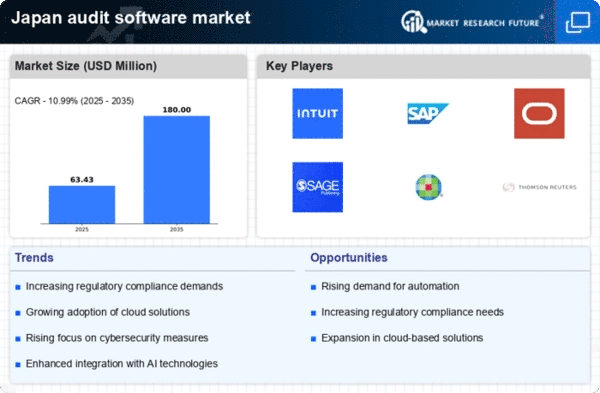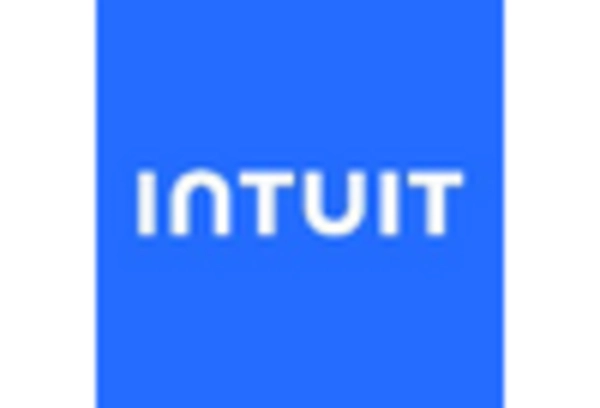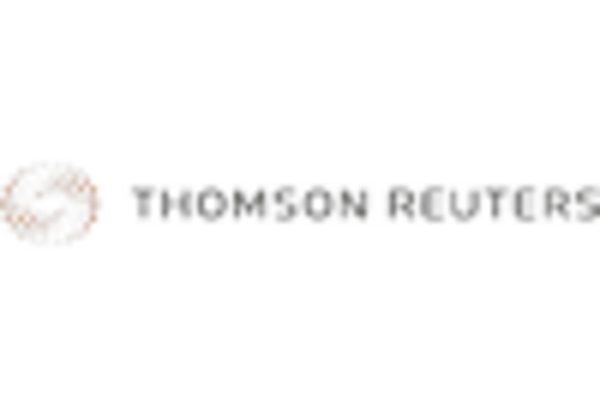Increased Focus on Cost Efficiency
Cost efficiency remains a critical driver for the audit software market. As organizations strive to optimize their operational expenditures, they are increasingly turning to audit software solutions that promise to streamline processes and reduce manual workloads. The potential for significant cost savings is evident, with studies indicating that companies can reduce audit-related costs by up to 30% through the implementation of automated audit solutions. This financial incentive is compelling, particularly for small and medium-sized enterprises (SMEs) that may have limited resources. Consequently, the audit software market is likely to see a surge in adoption as businesses seek to leverage technology to enhance their financial oversight while minimizing costs. The emphasis on cost efficiency is expected to drive innovation and competition among software providers, further enriching the market landscape.
Shift Towards Cloud-Based Solutions
The transition to cloud-based solutions is a significant driver for the audit software market in Japan. Organizations are increasingly adopting cloud technologies to enhance flexibility, scalability, and accessibility of their audit processes. This shift is particularly appealing to businesses that require remote access to audit data and collaboration among geographically dispersed teams. Recent statistics indicate that cloud-based audit solutions are projected to capture over 50% of the market share by 2026. The advantages of cloud computing, such as reduced IT infrastructure costs and automatic updates, are compelling factors that encourage firms to migrate to these platforms. As more organizations recognize the benefits of cloud-based audit software, the market is likely to expand, fostering innovation and competition among providers.
Emphasis on Enhanced User Experience
The audit software market in Japan is witnessing a growing emphasis on enhanced user experience. As organizations seek to improve the efficiency of their audit processes, the usability of software solutions has become a focal point. Companies are increasingly prioritizing intuitive interfaces and user-friendly features that facilitate ease of use for auditors and finance professionals. Research suggests that software solutions with superior user experience can lead to a 25% increase in productivity among audit teams. This focus on user experience is likely to drive the development of more sophisticated and accessible audit software, catering to the diverse needs of users. As firms continue to invest in technologies that enhance user satisfaction, the audit software market is expected to evolve, with a greater emphasis on design and functionality.
Growing Importance of Data Integrity
Data integrity is becoming increasingly paramount in the audit software market in Japan. As organizations face mounting pressure to ensure the accuracy and reliability of their financial data, the demand for robust audit solutions that can guarantee data integrity is on the rise. This trend is underscored by the fact that approximately 70% of Japanese firms have reported instances of data discrepancies in their financial records, highlighting the critical need for reliable audit software. Solutions that incorporate advanced validation and verification processes are likely to gain traction, as they provide organizations with the assurance that their data is accurate and trustworthy. The focus on data integrity not only enhances compliance with regulatory standards but also fosters greater stakeholder confidence, thereby driving the growth of the audit software market.
Rising Demand for Real-Time Analytics
The audit software market is experiencing a notable increase in demand for real-time analytics capabilities. Organizations are increasingly recognizing the value of immediate insights into their financial and operational data. This trend is driven by the need for timely decision-making and enhanced transparency in financial reporting. According to recent data, approximately 65% of Japanese companies are prioritizing real-time data access to improve their audit processes. This shift towards real-time analytics is likely to propel the growth of the audit software market, as firms seek solutions that can provide instant feedback and facilitate proactive risk management. The integration of advanced analytics tools within audit software is expected to enhance the overall efficiency and effectiveness of audits, thereby attracting more businesses to invest in these technologies.
















